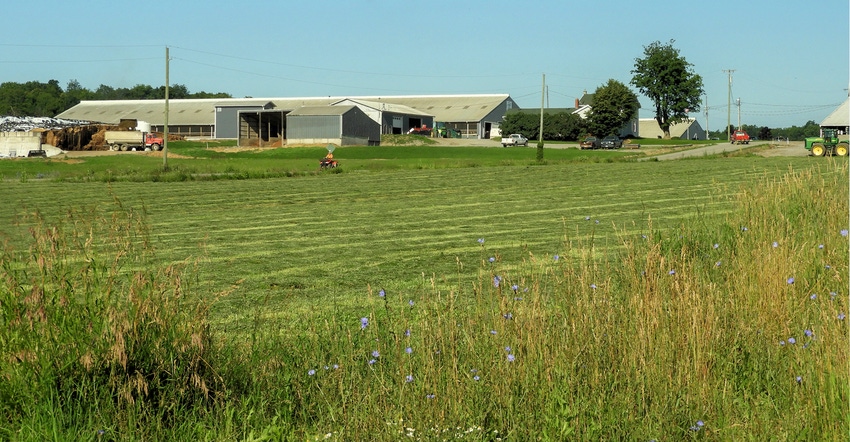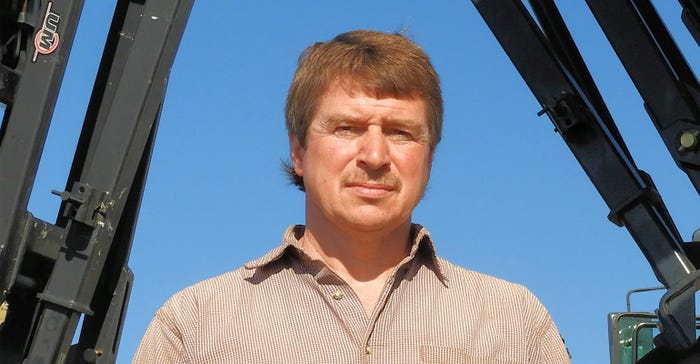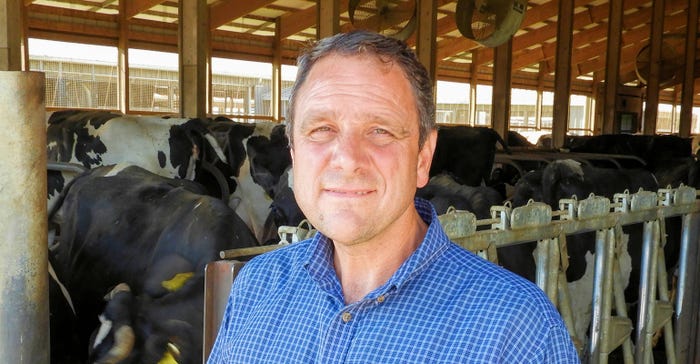
On Wednesday, Aug. 9, the New York Ag Leadership Luncheon at Empire Farm Days will honor Mike and Peter Dueppengiesser as recipients of the 2017 Agricultural Environmental Management Award. Ag Commissioner Richard Ball is scheduled to present the Empire State’s top environmental award to this third-generation family farm for their exemplary environmental management.
The brothers’ Dueppengiesser Dairy Co. of Perry, N.Y., is proof that farms can grow and be both sustainable and profitable by being environmentally responsible. They closely worked with Wyoming County Soil and Water Conservation District to meet the state’s top (Tier 5) standards while growing their business from 110 milking cows and 750 acres in 1990 to today’s 1,100-cow milking herd and 2,100 cropland acres.
“While implementing best management practices, this farm is always willing to provide input, at times presenting ideas more practical to accomplish while still providing water quality benefits,” says Greg McKurth, Wyoming County Soil and Water’s district manager. “They’ve taken the lead in addressing environmental issues through cover crops, nutrient management and other practices.”
BMPs boost bottom line
Dueppengiesser Dairy put many BMPs in place, including zone tillage, drainage systems, dragline manure management, grass waterways, sand and manure solids separation for reuse as bedding. When the brothers first began their expansion, “we started aggressive tillage to reduce soil compaction from bigger manure trucks and equipment,” recalls Mike.
Corn yields kept dropping until they switched to zone tilling at the advice of Dave DeGoyler and the Western New York Crop Management Association. They also began injecting manure via draglines to reduce heavy wheel traffic.
 FOCUSES ON CROPS: Mike Dueppengiesser searched and found solutions for soil issues dragging down corn yields.
FOCUSES ON CROPS: Mike Dueppengiesser searched and found solutions for soil issues dragging down corn yields.

“We can’t drive 30-ton spreaders on this ground,” Mike affirms. “The dragline opens up our application time frame” — holding manure during high-runoff potential times and spreading during optimum conditions to reduce runoff and compaction.
The combination improved soil quality and yields. “It took close to a dozen years,” he notes. “Now we have unbelievable earthworm populations. Corn yields have increased at least 20%.”
The farm grows three to four years of continuous zone-till corn silage. After manure application, wheat is seeded, for grain and bedding. Then, alfalfa follows wheat. This year, the Dueppengiessers are experimenting with ryegrass cover crop interseeding — another soil- and crop residue-building conservation practice.
The farm also has its own emergency spill action plan. “We have to be proactive, not reactive,” emphasizes Pete. That plan includes protocols, phone numbers of contractors and emergency personnel, even employee training for their 20 full-time people plus part-time help.
Growing their next-gens
The Dueppengiesser brothers have built an environmentally conscious business for their next generations. Pete’s two sons, Jake and Jarad, are Cornell University students, with special interest in the dairy and registered cattle. Mike has two daughters, Stephanie and Rebekah, plus high-schooler son Ryan, who also enjoys the cropping side of the business.
 DAIRY OVERSEER: Pete Dueppengiesser keeps all things running smoothly and productively on the milk production side.
DAIRY OVERSEER: Pete Dueppengiesser keeps all things running smoothly and productively on the milk production side.

The farm has hosted field days and demonstration plots with emphasis on protecting the environment. “Family working together alongside with great employees, who we are so thankful for, have made us successful,” concludes Mike.
The AEM Award boosts public awareness of farm efforts in preserving the environment. It’s co-sponsored by New York State Department of Agriculture and Markets, Empire State Potato Growers and American Agriculturist.
2017 AEM finalists included …
Four other environmentally-conscious farms competed for the 2017 honors:
• AngelRose Dairy, Bainbridge, N.Y., is owned by John and Diane Kemmersen. Their 90-cow grazing dairy on 350 rolling acres was nominated by Chenango County Soil and Water Conservation District.
The Kemmersens were among the first in the area to no-till grass seedings and immediately saw the reduced-tillage benefits — reduced soil erosion, reduced weed and pest problems, plus increased soil organic matter. With improved soil health, they reduced nitrogen inputs, yet increased corn yields by 10%.
• Birds All Dairy Farm, Canaseraga, N.Y., owned by Kim Shaklee and Janice Brown, was nominated by Allegany County Soil and Water. This 300-acre rotational grazing dairy milks 50 cows.
Forages have been no-tilled for 12 years. With conservation district design assistance, they installed a pasture irrigation system on 90 acres to help avoid summer grazing slumps with higher pasture yields. They’ve also implemented numerous BMPs, including stream habitat management and buffers,
• Dygert Farms, Palatine Bridge, N.Y., is owned by Robert and Shannon Dygert. They were nominated by Montgomery County Soil and Water.
The Dygerts milk 150 Holsteins, farm 425 acres and have started Dygert Farms Creamery, a glass-bottled milk distribution network. They’ve installed many BMPs, including nutrient management, rotational grazing, irrigation water management, riparian buffers and manure waste structures — reducing nutrient losses and purchased fertilizers.
• Orleans Poverty Hill Farms, Albion, N.Y., owned by Edward and Lillian Neal, was nominated by Orleans County Soil and Water. This family farm milks 560 cows and farms 1,000 acres of corn and hay for silage.
Reduced tillage, manure incorporation and cover crops are standard BMPs on this farm. Buffer strips along all streams and waterways on their land prevent sediment and nutrient runoff.
About the Author(s)
You May Also Like




